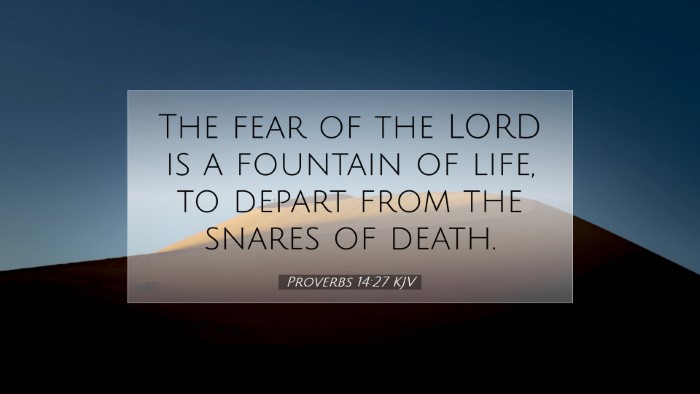Commentary on Proverbs 14:27
Proverbs 14:27 states, "The fear of the Lord is a fountain of life, to depart from the snares of death." This verse encapsulates a profound theological truth about the relationship between reverence for God and the essence of life itself. Below is a compilation of insights derived from esteemed public domain commentaries.
1. The Meaning of 'Fear of the Lord'
Matthew Henry expounds on the phrase "fear of the Lord," indicating that it signifies a deep reverence and respect toward God. Such fear is not one of dread, but a recognition of God's holiness, majesty, and authority. This reverential fear leads to wisdom and understanding, for it is through acknowledging God that one begins to comprehend the complexities of life.
Albert Barnes adds that this fear is foundational to a moral life; it is a principle that guides all actions and decisions. It is a disposition that promotes humility in recognizing human limitations while trusting in divine guidance.
2. 'A Fountain of Life'
The metaphor of "a fountain of life" suggests a source of nourishment and vitality. Adam Clarke elaborates that this fountain symbolizes the abundance and richness found in a life lived in alignment with God's will. The 'fountain' imagery implies that those who fear the Lord have access to a continuous and refreshing flow of life, much like water sustains physical existence.
Matthew Henry reinforces this by reflecting on how fear of God leads to a flourishing life. A person who holds God in high esteem will find guidance that directs them toward paths of righteousness, which naturally leads to well-being.
3. Departure from Death's Snares
The latter part of the verse, "to depart from the snares of death," presents a stark contrast between life and death. Albert Barnes suggests that the “snares of death” refer to various temptations and pitfalls that can ensnare an individual, leading to spiritual and possibly physical demise. The fear of God acts as a deterrent, preventing one from engaging in destructive behaviors.
Additionally, Adam Clarke points out that the snares can also be understood as the consequences of sin. The avoidance of these snares is rooted in the principles of a God-fearing life, which inherently seeks to uphold moral and ethical standards as outlined in Scripture.
4. Theological Implications
The fear of the Lord is not merely an Old Testament concept; it resonates through the entire biblical narrative. Matthew Henry states that both Old Testament and New Testament teachings emphasize the importance of divine reverence as fundamental to an authentic faith. This reverence leads to a lifestyle that promotes spiritual and moral integrity.
Albert Barnes also reflects on the consistency of this theme throughout Scripture, asserting that a trustful fear of God encapsulates the covenantal relationship between God and His people, where obedience flows from love rather than mere obligation.
5. Practical Applications
For pastors and theologians, this verse serves as a rallying call to instill a biblical foundation of fear and reverence for God within their congregations. Adam Clarke suggests that ministers should teach the principles of fear of God as central to Christian ethics, emphasizing a lifestyle of worship, respect, and obedience.
- Encouraging Spiritual Disciplines: Emphasizing the importance of prayer, meditation on God's Word, and communal worship as ways to cultivate fear of the Lord.
- Addressing Moral Choices: Helping individuals recognize the snares of death in contemporary society—such as materialism, immorality, and the pursuit of power—and providing guidance to navigate these challenges while anchoring their lives in God.
- Building a Culture of Accountability: Creating environments within the church where people can support one another in their journey of faith, fostering mutual respect and encouragement to maintain a God-fearing lifestyle.
6. Conclusion
In summary, Proverbs 14:27 offers a rich tapestry of meaning that underscores the importance of the fear of the Lord as essential for a flourishing life. It serves as a protective mechanism against the snares that lead to death—both spiritual and physical—reinforcing the call to live in obedience and reverence to God. For pastors, students, and scholars alike, this verse is not merely a proverb but a profound invitation to deepen one's relationship with God, thereby accessing the fountain of life it promises.


